Text
What did Napoleon want to achieve? This question is less about Napoleon’s goal in particular military campaigns than it is about his broader ambition. Did Napoleon have a lifelong aspiration or overarching aim? Was he pursuing a series of specific objectives? Or was he simply responding to circumstances, with no particular goal in mind?
It can be hard to know what our own motivations are, let alone those of someone who died over 200 years ago. It's particularly hard in Napoleon's case, as he was a master of propaganda who played a prominent role in writing and editing his own story. This means that we cannot necessarily take his word for what he was trying to achieve, especially when that word came after the fact. We can, however, look at things that Napoleon said earlier in his life about his goals and ambition. We can also look at what some of the historians who have tried to answer this question have said.
In the linked post, I take a closer look at Napoleon's goals during the various stages of his career, and at the nature of his ambition. Hope you find it interesting!
13 notes
·
View notes
Text

Detail of “The Death of Napoleon” by Charles de Steuben. Arthur Bertrand is peeking over Napoleon’s left arm.
Napoleon was fond of all the children in his entourage on St. Helena, but Arthur Bertrand (born on January 17, 1817) became his favourite. Glimpses of the two of them provide an amusing contrast to the often formidable portrait of Napoleon as Emperor.
One day, the Emperor wanted to have the noisy company of Countess Bertrand’s children at lunch. Saint-Denis told me the luncheon had gone very well, but that towards the end they started throwing bread balls at each other. The Emperor had taken the youngest on his knees, and was kissing and teasing him as he was pulling at his ears.
When Napoleon insisted that Arthur's sister Hortense have her ears pierced in an outdoor operation, Arthur was greatly alarmed.
He clinched [sic] his fists, and stamped with indignation, declaring that he would not allow his sister to be hurt. ‘You little rogue,’ said Napoleon, ‘if you are not quiet, I will have your ears bored also. Come, be obedient.’
In January 1821 Napoleon had a seesaw installed in the Longwood billiard room. Napoleon at first claimed it was a swing to amuse the children. He then admitted it was for his own use, to get more exercise. General Henri Bertrand recounts:
Arthur Bertrand went to see the Emperor, who showed him the seesaw and told him that it was a gun. Afterwards he and the Grand Maréchal got up on it to amuse the child. Napoleon had been on it for a quarter of an hour in the morning and didn’t feel any the better for it.
In the best-known vignette, Napoleon gives Arthur a pony. This was recounted by Napoleon’s first valet, Louis-Joseph Marchand.
A city resident had come to Longwood riding a small pony, and Arthur…asked the Emperor to buy it for him. As he spoke only English, the Emperor told him in that tongue: ‘Come at noon.’ But as was his habit, he went back inside, leaving the children to continue their games, got undressed and soon fell asleep. I was leaving the Emperor’s bedroom quietly when the fort cannon announced the hour of noon, and in the bathroom I found young Arthur fighting with Noverraz to enter the Emperor’s bedroom. I feared my refusal would make him cry and awaken His Majesty: I therefore made him understand that the Emperor was sleeping, and if he agreed to be good, I would let him enter and wait for His Majesty to awaken. ‘Yes,’ he answered; I took him by the hand, he went near the bed where the Emperor was resting, saw he was sleeping, then sat on the rug and stayed with me almost an hour, playing alone and noiselessly. When the Emperor awoke, he was quite surprised to find him there: ‘There you are, Arthur, what do you want, my boy?’
‘You tell me gun fire.’ I was not aware of the promise made to him.
‘What does he say?’ the Emperor asked.
‘He is telling Your Majesty that he told him to come back when the gun went off.’
‘Take him to Montholon, to find out what he wants.’ At that very moment, Count de Montholon was announced at the Emperor’s bedroom; he learned that during lunch he had told the child to come at noon, and he would buy him the little pony. ‘Gun fire’ was the cannon announcing that hour, and he came to claim the promise made to him. ‘Indeed! What a memory,’ said the Emperor, ‘is the horse still there?’ Count de Montholon, who had discussed the price with the owner, assured him it was. ‘But,’ said the Emperor, caressing the child and embracing him, ‘do you have any money?’
‘Yes, I have two dollars.’
‘That is not enough.’
‘Papa give everything!’
‘But Papa Bertrand has no money.’
‘I have plenty gold.’
‘Will you be good?’
‘Yes.’
“How much does he want for this horse?’ the Emperor asked General Montholon.
‘Fifty louis [1000 francs], Sire.’
‘Give this boy 1,200 francs,’ the Emperor said to me. I went upstairs to get the money that was locked up in a bag. The child was four years old, and on seeing me arrive, he held out his pinafore to catch the money. ‘You won’t be able to carry it.’
‘Yes, yes.’ I put the money gently in his pinafore to test his strength. He turned rapidly and, accompanied by Count de Montholon, he went to purchase the horse he wished to buy. Riding his horse, and held up by Count de Montholon, he came back almost immediately to the Emperor’s door, to thank His Majesty. Later on, having fallen from the horse, he no longer wanted it and switched back to his burro, a much quieter mount and more responsive to his wishes. The horse was given to Napoleon Bertrand, the eldest of the children, who sometimes accompanied the Emperor when his mother rode in the carriage with him.
For more about Arthur and his family, see "Napoleon and Arthur Bertrand."
65 notes
·
View notes
Text
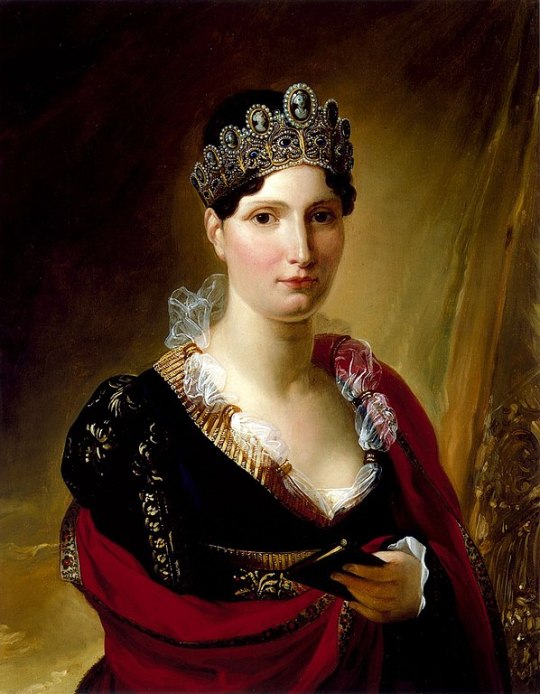
Elisa Bonaparte Baciocchi by Joseph Franque, 1812
Elisa Bonaparte was born on January 3, 1777. She was not as well-known as her sisters, beautiful Pauline and treasonous Caroline, but she was more capable than either of them. In fact, she was the Bonaparte sibling most like Napoleon, although she had the least influence over him. Napoleon himself said, “Elisa has the courage of an Amazon; and like me, she cannot bear to be ruled.” In 1805, he made her the Princess of Piombino and Lucca, where she formed an elaborate court, in imitation of the one in Paris. She took her duties seriously, ruling as a benevolent despot.
Elisa did such a good job that, in 1809, Napoleon made her Grand Duchess of Tuscany, a place she had long had her eye on. She moved her court to the Pitti Palace in Florence, which she refurbished in competition with Caroline’s court in Naples. Elisa's husband, Félix Baciocchi, commanded the local military division under his wife’s supervision. The two lived apart and took lovers.
When Napoleon’s empire began to crumble in 1814, Elisa broke away from her brother, hoping to save her own position. It was no use, as the Tuscans showed no sign of attachment to her and Elisa and Baciocchi had to flee. They tried, unsuccessfully, to make off with the silver and furniture from several of the palaces.
When Napoleon escaped from Elba and returned to France in March of 1815, the Austrians arrested Elisa and imprisoned her. She was released once Napoleon was safely on his way to exile on St. Helena. Elisa was given permission to live in Trieste, where she assumed the title of Countess of Compignano. She died of infection on August 7, 1820, at the age of 43.
When news of Elisa’s death reached Napoleon, he shut himself up alone for several hours. When he emerged, he said, “There is the first member of my family who has set out on the great journey; in a few months I shall go to join her.” He died nine months later, on May 5, 1821.
For more about Elisa, see "Elisa Bonaparte Baciocchi, Napoleon's Capable Sister."
38 notes
·
View notes
Text

Christmas Morning by Paul Seignac
Doing some Christmas shopping? Consider these Christmas gift ideas from the 19th century.
#christmas gift ideas#christmas shopping#christmas gift#19th century#1800s#19th century history#christmas
3 notes
·
View notes
Text

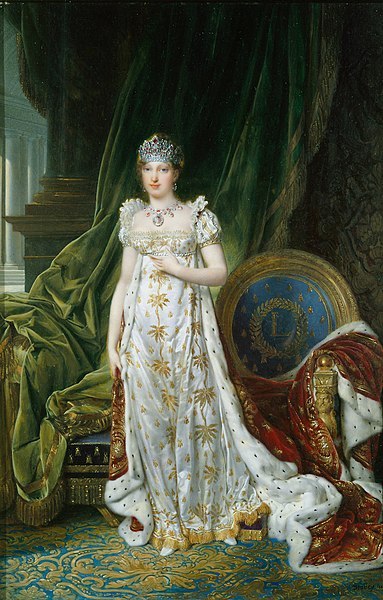
Though Josephine gets all the attention in the new Napoleon movie, Marie Louise (totally miscast in her brief appearance in the film) also played an important role in Napoleon's life. For details on how Josephine and Marie Louise viewed one another, see "What did Napoleon's wives think of each other?"
11 notes
·
View notes
Text
A faint and gracious smile
We found him, upon this occasion as upon many others, acting out of the ordinary rules of calculation; neither affecting the pathetic dignity of fallen greatness, nor evincing the uncontrollable dejection of disappointed ambition, of hopes crushed, never to revive, and of splendor quenched, never to rekindle. We found him calm and serene – he received us with a faint and gracious smile. He spoke with firmness and precision. I think the parallel for this moment was that when he presented his breast to the troops drawn out against him, on his return from Elba, exclaiming, ‘I am your emperor, strike if you will.’ There have been splendid traits in the life of this man, not to be reconciled to his other modes of conduct – his character is out of all ordinary keeping and to him the doctrine of probabilities could never, in any instance, be applied.
quoted from France by Lady Sydney Morgan, 1817.
Quote found in Shannon Selin's blog, Napoleon and the Marquis de Lafayette
21 notes
·
View notes
Text

Was Napoleon's last word really Josephine, as portrayed in the new Napoleon movie? Not likely.
Given the number of people surrounding Napoleon during his final days, there should be a clear record of his last words. But, as with most things involving Napoleon, there are several accounts of his dying hours and differences regarding what he actually said. If you want details, please see my article entitled "What were Napoleon's last words?" Here's the upshot:
Napoleon slipped into an incoherent state early in the morning of May 5, 1821. It was hard for his attendants to make out his last words.
Napoleon’s quoted last words were probably not a single connected phrase, but rather words that could be deciphered from generally inarticulate utterances.
Napoleon said (in French; he did not speak English) something about the army. On this, all four witnesses agree. Three agree that he said “head” and “army”; two that he said “head of the army” (tête d’armée).
According to two witnesses, Napoleon said something about France.
Napoleon may have said (in French) “who retreats,” “my son,” and/or “Josephine.”
Only General Charles de Montholon includes "Josephine" in Napoleon’s last words. Montholon wrote his memoirs some 20 years after Napoleon’s death, when he was imprisoned in the fortress of Ham. He was there with Louis-Napoléon (the future Napoleon III), who was the son of Napoleon’s brother Louis and Josephine’s daughter Hortense. Montholon and Louis-Napoléon had been captured during one of the latter’s attempted coups. It is not unreasonable to suspect that Montholon wanted to honour his friend and rally the French to Louis-Napoléon’s cause by showing that Napoleon’s last thought was for Louis-Napoléon’s grandmother. Thus, although “Josephine” is often cited as one of Napoleon’s last words, it is actually the least probable of them.
53 notes
·
View notes
Text
My foray into the podcast world. From the description:
"Napoleon Bonaparte. From military leader to revolutionary to Emperor of the French, his conquests and reforms have had a lasting impact across the world. But what impact did he have on the United States? And what if he had completed the journey across the Atlantic?
"Don Wildman speaks to author Shannon Selin, whose book 'Napoleon in America' imagines Napoleon's life in the United States. Together, they discuss Napoleon's relationship with and reputation in the United States, and the French people who did make the journey."
6 notes
·
View notes
Note
(@Gonapoleongo here) About the trailer: did Napoleon shoot a pyramid? My immediate thinking is ‘no and the sphynx thing is a myth’ but im a bit rusty on the Egypt campaign.
There’s no evidence for Napoleon shooting a pyramid. I don’t even know if this scene from the Ridley Scott trailer derives from some old propaganda he fell for or if it’s just something he decided to throw in for dramatic effect. But it’s just one of those things that will, unfortunately, make it too easy to fuel the criticisms of those already determined to hate this movie.
@shannonselin has a great article on Napoleon in Egypt and the various myths associated with his time there:
14 notes
·
View notes
Text
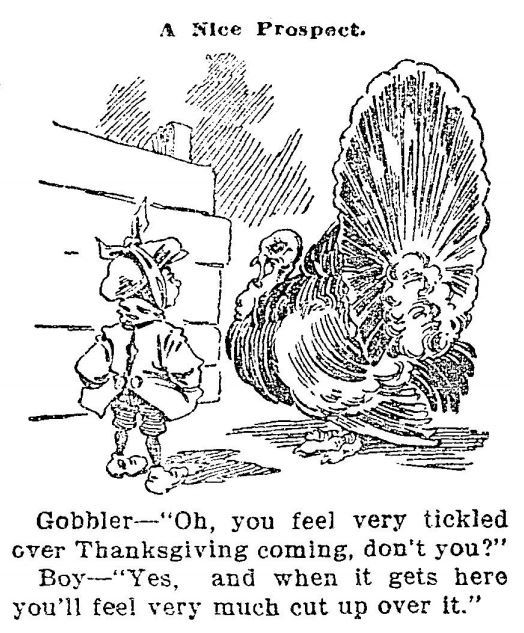
Happy American Thanksgiving! Thanksgiving did not become a national holiday in the United States until 1863. In the early 19th century, Thanksgiving was celebrated on a state by state basis, with each state scheduling its own holiday on dates that could range from October to January. What began as a New England tradition gradually spread to other states, although not without resistance. For details, see "Celebrating Thanksgiving in the 1800s."
2 notes
·
View notes
Text
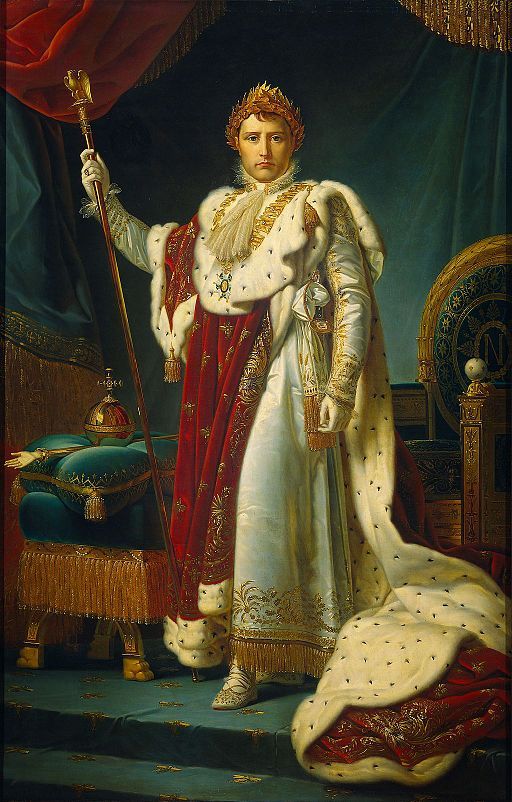
Happy birthday Napoleon!

The house in Ajaccio, Corsica in which Napoleon Bonaparte was born.
Napoleon Bonaparte was born on Tuesday, August 15, 1769, in Ajaccio, Corsica. France had acquired Corsica from the Italian city-state of Genoa the year before. Napoleon’s parents were Carlo and Letizia (Ramolino) Buonaparte. Their first surviving child, Giuseppe (Joseph), was 19 months old when Napoleon was born. Two older children, born in 1765 and 1767, had died in infancy.
August 15 marks the celebration of the Catholic Feast of the Assumption of Our Lady the Virgin Mary. Letizia was at mass in the Ajaccio cathedral when she felt severe labour pains. She left the service and walked the short distance to her house (Casa Buonaparte, now a museum), aided by Carlo’s sister Gertrude Paravicini.
Here, on a couch in the salon – for there was no time to reach her bedroom – with the assistance of Gertrude and a maid-servant, Mammucia Caterina, she was delivered of her fourth child – a boy, with a big head and a very intelligent face, who screamed loudly, and soon began sucking his thumb, which was considered a good augury among the peasants of Corsica.
Nine days later, Letizia turned 19 years old.
Nobody recorded anything about Napoleon’s birth at the time, and Letizia did not leave detailed memoirs. It wasn’t until Napoleon became a famous general that people became interested in his origins. Many myths sprang up surrounding his birth, which you can read about here (along with one element of Napoleon’s birth that might appear to be mythical but actually is not): https://shannonselin.com/2016/08/birth-napoleon-bonaparte/.
32 notes
·
View notes
Text
Leopold I of Belgium began life as a minor German prince. He served as a Russian general against Napoleon, married into the British and French royal families, and was offered two separate crowns of his own. As the first king of the Belgians, Leopold consolidated Belgium’s independence and ensured that Belgium’s interests were considered by the great powers. He was also the uncle of both Queen Victoria and Prince Albert.
#leopold i#belgium#royal history#queen victoria#napoleonic era#regency#georgian#19th century#princess charlotte
13 notes
·
View notes
Link
John Quincy Adams was the sixth president of the United States, from 1825 to 1829. He was also a diplomat, a senator, a secretary of state, a congressman, and an antislavery advocate. But did you know that he dressed carelessly, was considered ill-mannered, and found group meditation a waste of time? My latest post looks at things you might not know about JQA.
11 notes
·
View notes
Photo
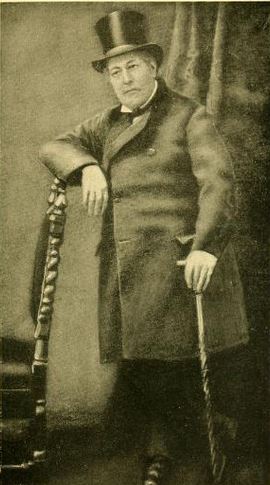
Charles Léon Denuelle in his later years
Napoleon’s first-born child, Léon Denuelle, died at Pontoise, northwest of Paris, on April 14, 1881, age 74, of stomach or bowel cancer. He was buried in a pauper’s grave in the local cemetery, marked with a black wooden cross. His remains were later dug up to make room for others. He has living descendants.
For details of Léon’s life, see “Napoleon’s Illegitimate Children: Léon Denuelle & Alexandre Walewski.”
29 notes
·
View notes
Photo

Napoleon at Fontainebleau on March 31, 1814 by Paul Delaroche, 1845.
Having lost his empire, his throne, his wife and son, and his followers, Napoleon tried to commit suicide at Fontainebleau in the early hours of April 13, 1814, rather than resign himself to a life in exile on Elba.
According to Montholon, Napoleon later provided the following explanation for this attempt.
My life no longer belonged to my country. The events of the last few days had again rendered me master of it. ‘Why should I endure so much suffering?’ I reflected, ‘and who knows that my death might not place the crown on the head of my son?’ France was saved. I hesitated no longer, but leaping from my bed, mixed the poison in a little water, and drank it with a sort of feeling of happiness. But time had taken away its strength; fearful pains drew forth some groans from me; they were heard, and medical assistance arrived. God didn’t want me to die yet. Saint Helena was my destiny.
For details, see “When Napoleon Attempted Suicide.”
58 notes
·
View notes
Link
Virginie Ghesquière was a French woman who disguised herself as a man and fought as a soldier in Napoleon’s army. Her story formed the basis of many popular tales, but how much of it was true? In this post, I try to separate fact from fiction.
#virginie ghesquière#virginie chesquière#napoleonic wars#women soldiers#female soldier#napoleonic#women warriors#women war
38 notes
·
View notes
Photo

Napoleon II, styled King of Rome, later Duke of Reichstadt, by Thomas Lawrence, 1818-1819
Napoleon’s only legitimate child, Napoleon François Charles Joseph Bonaparte, was born at the Tuileries Palace on March 20, 1811, to all the splendor of the French Imperial Court. His birth was a touch-and-go affair. The doctor feared that either Napoleon’s wife, Marie Louise, or the baby might die. Napoleon said he would have preferred being at a battle.
The baby was given the title of King of Rome. He was later known as Napoleon II, the Prince of Parma, and the Duke of Reichstadt. He did not hold all of those titles at the same time, and you can tell whether someone was a supporter of Napoleon based on how they referred to the boy after 1815. His nickname was l’Aiglon, or the Eaglet (one of Napoleon’s symbols was the eagle).
He led a short, sad life, living in exile from France and dying of tuberculosis at the age of 21. For details, see “Napoleon II: Napoleon’s Son, the King of Rome.”
39 notes
·
View notes